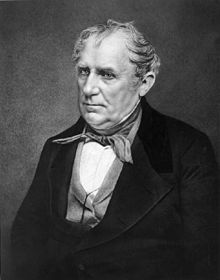Literature of the New Nation – Irving & Cooper
103 Author Introduction-James Fenimore Cooper
Wendy Kurant

James Fenimore Cooper, author of the Leatherstocking novels, beginning with The Pioneers (1823), and seafaring tales like The Pathfinder (1840), was himself a pioneer and pathfinder for later writers like Herman Melville and Mark Twain. Cooper dramatized unique American experiences, such as the fast vanishing wilderness, and unique American characters, such as Natty Bumpo, who was based in part on the explorer Daniel Boone (1734–1820). Influenced by the historical romances of Sir Walter Scott, Cooper wrote of the uncommon common man, sprung almost from untouched nature itself but certainly from the fast-changing American landscape, in a time and place where he seemed an anachronism but also a touchstone of American ideals.
Cooper was born into a well-to-do family, growing up in Cooperstown, a frontier village on the southern shore of Ostego Lake developed by his father William Cooper (1754–1809). William Cooper was a judge and member of Congress who, after Fenimore Cooper was expelled from Yale for misconduct (perhaps a brawl), would obtain a position for him in the United States Navy. After William’s death, Cooper inherited part of his father’s large fortune. He left the Navy in 1808 and married Susan Augusta de Lancey—daughter of a wealthy Westchester family— three years later. He turned to writing to recoup financial losses, likely due to his own poor management.
After a poor showing in Precaution (1820), a novel of manners, Cooper found his stride in The Spy (1821), a historical novel set during the American Revolution. He did not plan to write the Leatherstocking novels as a series, but The Pioneers was so popular that he followed it three years later with The Last of the Mohicans (1826). Set during the French and Indian War, this novel has a quality of nostalgia for chivalry embodied in the simple nobility of Natty Bumpo and his friendship with the Native American Chingachgook. It also considers such social issues
as miscegenation and racial conflict. In much of his work, Cooper exalted the American way of life, democracy, and individual rights. Yet he faced unpleasant truths about America, including growing demagoguery, unfair property rights, and too-rapid urbanization.
From 1826 to 1833, Cooper lived in Europe, where he was acclaimed as “the American Scott.” He wrote novels set in medieval Europe and contrasted American and European governments in travelogues, including his Gleanings in Europe series (1836–1838). This attention to Europe tarnished Cooper’s reputation in America, yet he continued to write prolifically until his death in Cooperstown in 1851.
Source:
Becoming America, Wendy Kurant, ed., CC-BY-SA
Image Credit:
Figure 1. “James Fenimore Cooper” Photograph by Mathew Brady, 1850, Wikimedia, Public Domain

